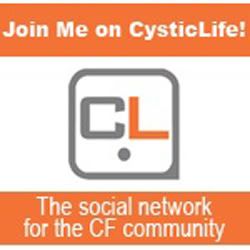I pulled this cool article about Hypertonic Saline (HTS) from Cystic Fibrosis Worldwide. I thought it was an pretty interesting read and I learned some things about 7% that I had never known before. Also, keep in mind that it is an older article so some of this stuff may seem a little dated. Enjoy!!!
About Hypertonic Saline
Hypertonic Saline (HS) is just a strong salt-water solution. The concentration used is typically about 7% salt - that is, about twice as salty as seawater — although sometimes weaker or stronger concentrations are used. Hypertonic saline can be turned into a mist by a simple device called a nebuliser. The mist can then be inhaled into the lungs.
How Does Hypertonic Saline Help in CF?
When Hypertonic Saline is inhaled into the lungs, the body tries to dilute the strong salt concentration. The cells lining the airways are triggered to release water. This restores the layer of moisture lining the airways, which helps the mucus to clear the same way it does in healthy lungs. You could think of it as the lungs “flushing out” the stagnant, infected mucus.
Studies done during the mid 1990s showed that inhaling nebulised Hypertonic Saline temporarily increases the speed at which mucus is cleared from the lungs. Subsequent short-term trials showed that inhaling nebulised Hypertonic Saline on a regular basis (usually twice per day) improves lung function in PWCF.
What was the recent trial about?
Although the short-term trials were favourable, it was not known whether Hypertonic Saline is safe and effective when used for long periods. The National Hypertonic Saline Trial tested 164 stable subjects with CF aged at least 6 years of age. These subjects were randomly allocated to inhale either 4mL of Hypertonic Saline (7% saline) or 4mL of placebo (a very weak salt solution — less than one third as salty as sea water). Both solutions contained an inert substance to disguise the taste, so subjects didn’t know which solution they were inhaling. The subjects inhaled their allocated solution twice daily for 48 weeks. They kept up all their other standard therapies, and received whatever additional treatment they normally would whenever they had a flare-up. Patients were checked regularly for signs of improvement, as well as for any possible adverse effects.
What did the trial show?
The main outcome of the trial was lung function — a breathing test, which measures how well the lungs, can shift air in and out. The subjects who were inhaling the Hypertonic Saline had a modest rise in their lung function at the first measurement point (that is, after 4 weeks). This improvement was maintained until at least the last measurement point (that is, 48 weeks).
A much greater effect was seen on the flare-ups of lung infection. The subjects who were inhaling Hypertonic Saline had far fewer flare-ups. The flare-ups they did have tended to be milder, not lasting as long. Although both groups of subjects used a lot of antibiotics to try to prevent flare-ups, those inhaling Hypertonic Saline needed significantly fewer “extra” antibiotics for flare-ups.
Those subjects who were inhaling Hypertonic Saline also reported improved attendance at school, work or other usual activities. On average, those inhaling the placebo missed 17 more days of school/work than those inhaling Hypertonic Saline. People inhaling Hypertonic Saline also felt like their overall health and quality of life was better.
Were there any adverse effects?
Hypertonic Saline can cause the airways to narrow — just like they can do in asthma. In the National Hypertonic Saline Trial, all subjects took a drug to open their airways, called a bronchodilator, just before each dose. This was very effective in limiting the amount of airway narrowing. For this reason, it is strongly recommended that:
• people with CF take a bronchodilator before each dose of Hypertonic Saline and that
• people with CF are supervised when they inhale their first dose of Hypertonic Saline.
Their lung function should be measured before and after the dose, to check that the bronchodilator is strong enough to prevent significant airway narrowing.
Those subjects inhaling Hypertonic Saline also reported more coughing during and immediately after their inhalations. Thus, coughing should be expected when using Hypertonic Saline. However, the coughing tended to settle within the first few doses, the first few days, or at the most, the first few weeks. The coughing was severe enough to prevent people from using Hypertonic Saline in the longterm in only a very small number of cases. In practice, a lower concentration of saline may be more tolerable for these people.
The lungs were also assessed very closely for signs that the constant inhalation of Hypertonic Saline was causing more inflammation in the lungs. There was no evidence of this at all. Also, the use of Hypertonic Saline did not affect which bacteria were found in the lungs, nor their concentration in the mucus.
http://www.cfww.org/pub/english/cfwnl/7/619/Hypertonic_Saline_Research










